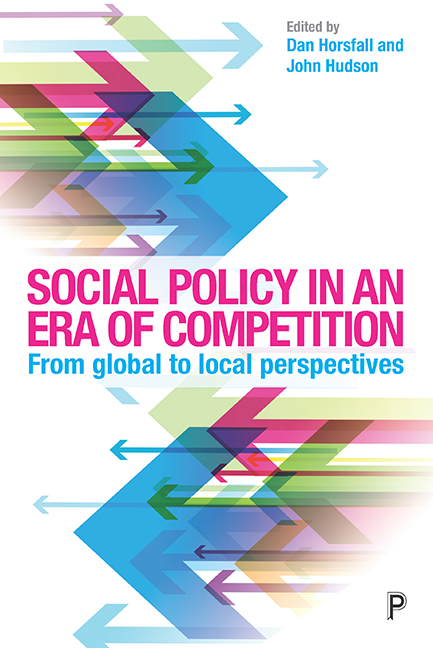Book contents
- Frontmatter
- Contents
- List of figures, tables and boxes
- List of contributors
- List of abbreviations
- Introduction: social policy in an era of competition
- Part One Global competition as the context for welfare
- Part Two The impact of intensifed competition on local governance
- Part Three The reframing of welfare discourses in an era of competition
- Part Four Conclusions
- References
- Index
nine - Global ‘vulnerabilities’: new configurations of competition in the era of conditionality?
Published online by Cambridge University Press: 05 April 2022
- Frontmatter
- Contents
- List of figures, tables and boxes
- List of contributors
- List of abbreviations
- Introduction: social policy in an era of competition
- Part One Global competition as the context for welfare
- Part Two The impact of intensifed competition on local governance
- Part Three The reframing of welfare discourses in an era of competition
- Part Four Conclusions
- References
- Index
Summary
Introduction
Increased emphasis on personal responsibility and the steady erosion of social rights have been defining features of changing citizenship configurations in what Cerny and Evans (2004) called the ‘competition state’. As is evident in policies such as the extension of conditional welfare arrangements (Dwyer, 2004; 2016 and Chapter Eight this volume) and increasingly punitive criminal justice sanctions in recent decades (Garland, 2001; Rodger, 2008; Wacquant, 2009), the behaviours of those who fail to meet standards of ‘appropriate’ behaviour are now surveilled and disciplined with intensified fervour (Burney, 2005; Flint, 2006; Harrison and Sanders, 2014). At the same time, though, ideas that gesture towards more inclusive approaches such as ‘support’, ‘social inclusion’ and ‘partnership’ have also influenced recalibrations of welfare in ‘advanced’ liberal democracies (Lister, 1998; Newman, 2001; Muncie, 2006). It is within this context that vulnerability has taken root as an influential and popular concept in policy making and in broader debates about welfare and regulatory provision. This chapter considers the role of ideas about vulnerability in reconfigurations and recalibrations of contemporary welfare, exploring the governance strategies and cultural scripts that these give rise to in an era of global competition.
Vulnerability is most often a ‘taken for granted’ or normative idea in policy and public spheres, a malleable and opaque concept characterised by plurality of meaning and constructed in relation to a wide range of factors (Appleton, 1999; Fawcett, 2009; Daniel, 2010). Drawing on the notion to frame its Report on the world social situation, the United Nations Department of Economic and Social Affairs (2003, p 8) notes that vulnerability is increasingly referenced in social policies but its use is ‘quite loose’ and tends to lack ‘theoretical rigour’. In the context of austerity politics, organising welfare provision on the basis of prioritising the protection of the most vulnerable is often set out as strategy that makes sound financial and ethical sense. Equally, resistance to current welfare retrenchments or cuts to state services is also often couched in terms of unacceptable vulnerabilities that result from such changes.
- Type
- Chapter
- Information
- Social Policy in an Era of CompetitionFrom Global to Local Perspectives, pp. 149 - 164Publisher: Bristol University PressPrint publication year: 2017

